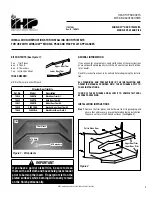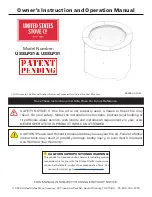
There is also 1" unit base standoffs that are supplied
with the unit. These are optional and are to be used
to raise the unit. The thickness of the finished hearth
will dictate the height of the stove. Please be careful
to ensure that the bottom louver will open when unit
is installed with the finished hearth.
The fireplace may be positioned and then the
framing built around it, or the framing may be
constructed and the fireplace positioned into
the opening.
The minimum ceiling height is 7ft (2m) from the
base of the unit. A suitable non-combustible
hearth pad is mandatory in all installations. See
Framing Details section.
INSTALLING THE
CHIMNEY SYSTEM
Following are a set of general guidelines for
installation of the chimney system. The more
detailed installation manual supplied with the
specific chimney system must be followed.
ENSURE THE INSTALLER APPLIES THE
WARNING LABELS TO ALL CHIMNEY PIPE
SECTIONS THAT WILL NOT BE VISIBLE
AFTER INSTALLATION IS COMPLETE
1)
Using standard construction framing
techniques, construct the opening for the
chimney route up through the ceiling(s) and
roof or through an outside chase. Framing
must maintain adequate minimum air space
clearance at all times.
CAUTION
: Allow a minimum 2" (51mm)
chimney air space or as specified by
the owner's manual for the chimney, to
combustible framing members throughout
vertical or offset chimney installation.
2)
Attach fireplace adaptor/anchor plate to
the top of the fireplace. It is important that
a tight seal be made with this part and the
unit’s collar.
Note:
Fireplace adapter must be purchased
with fireplace when using air cooled. When
using duraplus - purchase adapter with
chimney system from chimney supplier.
3)
Install firestop, radiation shield, or attic
insulation shield as required at each floor
penetration. See Table 1 (page 15). Check
chimney manufacturer's framing opening
sizes to allow for correct clearances. All
parts must be listed.
4)
The roof flashing should be installed making
sure that alignment is correct with openings
below.
5)
Chimney lengths may now be added until
the required height is reached. A minimum
flue height of 12ft. (4m) from the top of the
unit is mandatory. Please refer to Table 2
for Flue Heights (in this manual).
INSTALLING THE STAND-
OFFS
Stand-offs are installed to provide reduced tempera
-
tures and proper clearances for the safe installation
of your product. They consist of four 3" (76mm)
stand-offs on the back, two 3" (76mm) stand-offs
on each side and one 8" (203mm) stand-off on
the top of the unit.
Attach these stand-offs where indicated in the
pre-drilled holes on the unit body.
IMPORTANT: Insulation extends forward
to seal against the back of the fireplace
masonry or non-combustible face.
SET FIREPLACE
INTO POSITION
1)
Estimate the total weight of the fireplace system
and surround materials such as brick, stone,
etc., to be installed. Shipping weight is 612
lbs (278kg).
2)
Measure the square footage of the floor space
to be occupied by the system, surrounds and
hearth extensions.
3)
Note the floor construction, i.e. 2 x 10’s, (51
x 250 mm), single or double joists, type and
thickness of floor boards and consult your local
building code to determine if you need additional
support.
4)
Remove door, firebox bricks, louvers etc.
Note: Set aside Gold louvers away from harsh
chemicals and away from abrasive ma-
terials to avoid damage, e.g. muriatic
acid for masonry wash will strip the gold
plate. Firebricks are fragile and should
be handled with caution.
IMPORTANT: It is absolutely necessary
to attach stand-offs to the unit to
avoid combustion problems. Serious
overheating of combustible framing and
possible fire may result if stand-offs are
not properly installed.
IMPORTANT: Under no circumstances
can the fireplace top or side spacers be
removed or modified. Do not notch the
header to be installed closer than the
fireplace outside facing spacers.
The fireplace may be installed directly on a combus
-
tible floor or raised on a platform of an appropriate
height. Do not place fireplace on carpeting, vinyl
or other soft floor coverings. It may, however, be
placed on flat wood, plywood, particle board or
other hard surfaces. Be sure the fireplace rests
on a solid continuous floor or platform for support
and to prevent cold air from entering the room
from under the fireplace, if against an outside wall.
ASSEMBLY STEPS
Note: The following steps represent the
normal sequence of installation. Each
installation is unique, however, and
might require different steps. Each
step is dealt with in detail in the following
pages.
1)
Install stand-offs and insulation strip to the unit.
2)
Complete framing and installation of the nailing
strips for the FP90.
IMPORTANT: Remove gold
accessories such as louvers
while installing to avoid marking.
Position firebox prior to framing or into prepared
framing. See Framing Details section.
3)
Install the Chimney System.
4)
Install Outside Combustion Air Kit and Chase
Ventilation Grill.
IMPORTANT
: A chase vent of 30 in
2
(194
cm
2
) MUST be installed in all applications,
otherwise serious overheating of the chase
may result. Use the chase vent supplied with
the FP90 unit only.
5)
Hook-up the Wiring.
6)
Install the Blower.
7)
Gravity Air Feed Option.
8)
Complete finish wall material, surround and
hearth extension to your individual taste.
9)
Position vermiculite liner / bricks and ceramic
fiber insulation in the unit. Attach louvers, glass,
doors, handles.
14
| FP90 Wood Fireplace
|
14
installation
Summary of Contents for classic fp90
Page 3: ...FP90 Wood Fireplace 3 3 ...
Page 13: ...INSTALLATION MEASUREMENTS FRAMING DETAILS FP90 Wood Fireplace 13 13 installation ...
Page 41: ...FP90 Wood Fireplace 41 41 notes ...
Page 46: ......
Page 47: ......















































